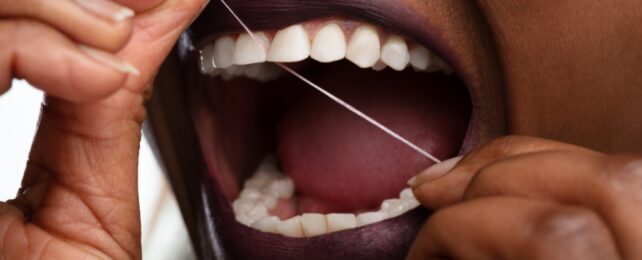From the youngest age we're told we ought to brush our teeth to avoid losing them as we age. It now seems it's not just the health of our gums that are at stake. Our brain could suffer from poor dental hygiene.
Researchers in Japan found a connection between tooth loss, gum disease, and shrinkage in a region of the brain involved in memory and Alzheimer's disease called the hippocampus.
Shockingly, the results imply it might in some cases be better to lose diseased teeth to preserve not just the health of gums but of the brain as well.
"These results highlight the importance of preserving the health of the teeth and not just retaining the teeth," says geriatric dentist Satoshi Yamaguchi of Tohoku University.
This adds to existing research on oral health amid growing awareness of its connection to cognitive function.
The findings of the study of 172 people over four years don't establish causation; rather, they demonstrate an association between these factors. Still, the implications of studies like this one could affect how dentists make critical decisions about our oral health.
The participants, all aged 55 years or older, took memory tests at the beginning of the study, and the researchers collected data on each participant's general health and medical history, using questionnaires and medical tests.
Participants were only included in the study if they had no memory issues at the start. Magnetic resonance imaging ( MRI) allowed Yamaguchi and his team to determine the volume of their hippocampus at baseline and four years later.
Dentists counted the number of teeth in each participant and examined periodontal probing depth (PD), a gauge of the gum tissue around each tooth that can give an indication of gum disease.
"Tooth loss and gum disease, which is inflammation of the tissue around the teeth that can cause shrinkage of the gums and loosening of the teeth, are very common," Yamaguchi explains, "so evaluating a potential link with dementia is incredibly important."
A healthy PD range is between one and three millimeters; PD of three or four millimeters in multiple spots is classified as mild gum disease; and severe gum disease involves PD of five or six millimeters in several spots. Analysis was based on the average PD for each participant at baseline and four years later.
The researchers discovered that the number of teeth and the extent of gum disease were related to changes in the left hippocampus of the brain. The hippocampus experiences volume loss early in Alzheimer's disease progression.
The left hippocampus shrank more quickly in people with mild gum disease who also had fewer teeth. One less tooth increased the rate of brain shrinkage in people with mild gum disease by an amount that was nearly equal to an additional year of brain aging.
On the other hand, in individuals with severe gum disease, having more teeth was linked to a faster rate of brain shrinkage in the same region. The increase in left hippocampus shrinkage caused by one more tooth was equivalent to 1.3 years of brain aging, in people with severe gum disease.
These differences were seen after the researchers took into account the ages of the participants.
"The findings suggest that retaining teeth with severe gum disease is associated with brain atrophy," says Yamaguchi. "Controlling the progression of gum disease through regular dental visits is crucial."
The study involved a small number of people, all from one region in Japan, making it important that studies should be undertaken on a larger, more diverse populations before these results can be generalized.
Nevertheless, it's a reminder to us all that our pearly whites are important not just for life-long chomping, but for keeping our thinking clear too.
"Our study found that [tooth loss and gum disease] may play a role in the health of the brain area that controls thinking and memory, giving people another reason to take better care of their teeth," says Yamaguchi.
The research has been published in Neurology.
